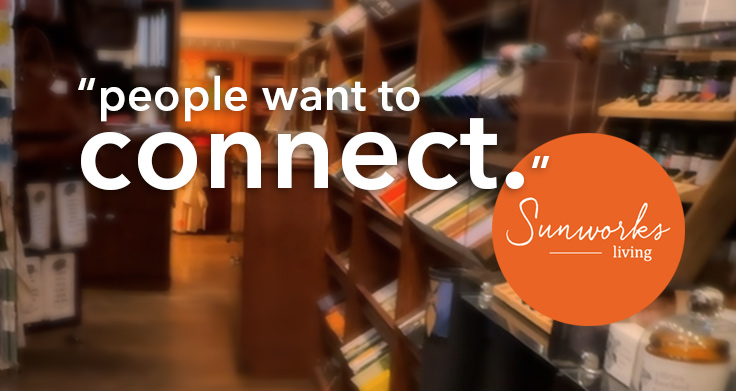
Handshakes and Hellos: Sunworks Living
Red Deer, Alberta, Feb. 2024
Our journey with the Alberta Unboxed series begins with Paul Harris, principal of Sunworks Living, a café, gift shop, co-work office space, gallery (and much more), located in the heart of Red Deer. Stepping into his world, we were greeted by a friendly man who towers in physical stature and via the philosophy he embodies—one that prioritizes genuine connection over the transactional noise so common in today’s marketing landscape.
We saw Paul’s website and knew we had to reach out. In a move that could be seen as a daring act of rebellion against the time-consuming demands of e-commerce, Paul had transformed Sunworks’ website into something resembling an online business card. This website, crafted in a few hours by a man who was fed up with our overreliance on technology, won’t be winning any design awards anytime soon.
Yet, it offers a refreshingly honest story of someone who chose to prioritize real human interactions over the endless upkeep of an online storefront. Harris’s decision reflects a deliberate shift away from the digital to foster genuine connections within the tangible, vibrant life of his store.
Still chuckling at the website, we called the number listed to see if he’d take time to discuss his business with us.
He graciously accepted.
Paul provided real advice built on his education and successful career, centered around fostering real connections in business, a lesson many could stand to revisit. His contagiously optimistic laugh, the welcoming atmosphere of his store, and his eagerness to share the stories behind his products all serve as testaments to a business philosophy deeply rooted in authenticity and care.
During a tour of the Sunworks Living, we also had the pleasure of learning about the contributions Paul has made to the community of Red Deer, particularly in the downtown.
“we call our customers, we send emails, we use SMS.Paul Harris
Social Media is Overvalued
His trend-opposing perspective on the overvaluation of social media is a compelling commentary on the current state of digital marketing. He discusses a sense of irony in how businesses tirelessly chase digital engagement—likes, follows, and subscribes—while neglecting a significant portion of their potential audience who are either indifferent to or actively disconnecting from social media platforms.
As Harris observes, “I’m not a big fan of social media. I feel it’s overused and overvalued.” He pinpoints a disconnect between perceived social media value and actual business outcomes.
Harris’s stance suggests a broader critique of modern marketing’s fixation on quantifiable engagement metrics that may not necessarily translate into deeper customer relationships or business success.

Don’t forget about the customers you already have:
“People seem to think that if you do social media, you’re going to get customers. They forget that there’s a large percentage of people that don’t use social media,” he observes. This highlights the importance of recognizing and catering to the diverse preferences and behaviors of a target market, including those who may be seeking more authentic and less intrusive forms of engagement.
In an era where digital presence is often equated with business viability, this approach serves as a reminder of the value inherent in personal connections and the potential limitations of over relying on social media for business growth. By advocating for direct marketing methods such as emails and SMS, which allow for a more personalized and engaging dialogue with customers, Harris points towards alternative strategies that can foster genuine loyalty and support without the need for constant digital noise.
Email & SMS Before Social Posts
Harris’s approach leans heavily into the power of direct marketing channels like email and SMS, which foster a deeper rapport with customers.
“Sometimes we call our customers, we send emails, we use SMS.” This underscores the value of building steady, loyal customer relationships over the impersonal scattergun approach typical of social media marketing.
His well-executed email marketing (which we have nothing to do with) captures attention in a straightforward yet engaging manner, reminding us of the value of clear communication. His strategy emphasizes making the recipient feel valued and considered, notably informing readers upfront about what to expect, including how long it will take to engage with the content. Our inclusion of the time to read at the top of this article is due to his reminder about how effective being considerate and direct can be. This approach is reflective of Harris’s broader business efforts, where the experience of each interaction is prioritized.

E-Commerce can be Impractical
“The effort to putting products online far outweighed the value of actually selling them online,”
Paul Harris’s journey with e-commerce reveals a nuanced perspective on the balance between digital and physical retail spaces. Initially, driven by the universal push towards online selling, Sunworks Living embarked on setting up e-commerce, a venture that saw limited success initially and a brief spike during the COVID-19 pandemic as customers rallied to support local businesses. However, the spike was short-lived, and the venture into e-commerce quickly revealed its complexities, especially for a store with thousands of unique SKUs, including one-of-a-kind handmade items and seasonally changing products like greeting cards.
Harris reflected on the challenges of maintaining an up-to-date online inventory with such a diverse and ever-changing product range. In his words, “The effort to put products online far outweighed the value of actually selling them online.” This highlights the impracticality of selling $5 greeting cards online or shipping unique, single-edition items across North America.
Interaction and Atmosphere:
This experience led to an important realization: the essence of Sunworks Living’s appeal lies in the physical interaction customers have with the store’s atmosphere and its products. Encouraging people to visit the store in person became a priority, even though some were disappointed by the removal of the online shopping option. Harris’s narrative underscores a critical lesson for small businesses: while e-commerce offers broad reach and convenience, it may not suit all business models, especially those built around unique, tangible experiences and products that demand to be seen and touched.
He mentioned a policy that vividly illustrates this: when serving customers at the counter, if the phone rings, it goes unanswered. This practice is rooted in the belief that individuals standing before you deserve undivided attention, underscoring a respect for the time and effort it takes for someone to visit the store physically.
He warmly recounted recently welcoming a new neighbor, a barber fluent in Arabic and French who opened up shop across the street. This wasn’t just a casual hello; it was a testament to Paul’s deep-seated belief in building a community through mutual support. Paul’s approach, seeing the value in connecting and potentially sharing customers, exemplifies a kind of neighborliness that’s more than just friendly; it’s smart business. In our digital age, the power of personal connection, understanding local markets, and being a genuinely good neighbor can make all the difference.
Handshakes and Hellos
Paul advocates for a direct approach to engaging potential customers, emphasizing personal outreach over passive waiting. He recommends stepping out from behind the computer screen to introduce your business to neighbors with product samples and business cards in-hand.
A small gesture like a box of scones and a greeting can introduce your business to an entire office of workers. Don’t try to sell them anything, just greet them and let them know who you are and what you do. If you can, offer samples of your products for free. If you can’t, consider stopping by a local bakery to pick up some snacks to drop off to your neighbors.
Sure, you can’t give free things to everyone walking by, but you can make a few peoples’ days better, once in a while. This lets them experience how great your product is, and also makes for a great story for them to retell when they get back to their office or home.
Paul is also known to be found outside his shop’s front door saying hello to people who walk by, sometimes with a tray of cookies to be given away. It’s a great way to get to know people in your neighbourhood, and a strategic way to advertise your business.
When compared to the high costs and time to administer digital ad campaigns, smaller bakeries and shops like Sunworks are well-served by this direct form of engagement. By opting for handshakes and hellos over just trying to get clicks, likes, and new subscribers, Harris focuses in ways that are likely to gain repeat customers who have a tether nearby to his store.
Success goes hand-in-hand with community
In 2019, Paul Harris and Sunworks’ move highlighted Red Deer’s community spirit and the power of asking for help. They managed the move to a new spot just around the block with an impressive volunteer turnout. This group formed a human chain, and efficiently passed items hand-to-hand, completing what could have been days work in just a few hours, then celebrated with a meal. It was a straightforward, yet powerful example of collaboration, showcasing how asking for help can lead to meaningful collective achievements.
Small businesses can take a leaf out of Paul’s book, looking beyond the digital facade to the tangible, rewarding connections right on their doorstep. This gesture towards the barber symbolizes a broader strategy, one where success is shared and community bonds are strengthened.
More about Paul Harris
Paul describes himself as someone who is passionate about personal and community transformation and seeks to understand the complex issues that interconnect all of us.
With over 27 years developing successful retail and hospitality establishments, non-profit organizations, and serving on municipal councils, Paul boasts an impressive breadth of experience. Having helped nurture businesses since starting his first endeavor at age 12, he has mentored numerous entrepreneurs, and worked with organizations to help find unique opportunities for change. His work with individuals focuses on the relationships one forms, and in finding control and agency in their professional careers.
Paul has spearheaded innovative housing developments focused on sustainability and accessibility. Several of the most popular restaurants and beloved local businesses in Red Deer were founded under his leadership. Beyond business, Paul has served municipal government bodies including the Federation of Canadian Municipalities, championing community growth initiatives across culture, infrastructure, and economic policy.
Central to Paul’s community-building mindset is the theory of social constructionism and the notion that our conversations shape our collective future. His post-graduate studies spanned Canada, USA, and Europe, no doubt contributing to his skilled generalist tool kit. Through his education, mentorship and hands-on development work, he seeks to uplift individuals and communities through thoughtful dialogue and purposeful action.
Learn about, and from, Paul:






